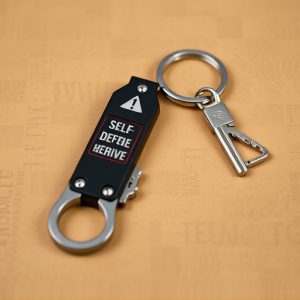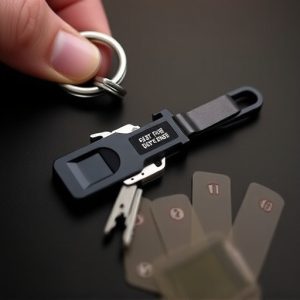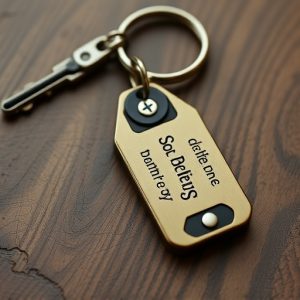Optimize Your Kubotan: Metal Defense Keychain Material Guide
Selecting the optimal metal for a Martial Arts Kubotan keychain is key for functionality and durabil…….
Selecting the optimal metal for a Martial Arts Kubotan keychain is key for functionality and durability, impacting grip, strength, and performance in self-defense. Stainless steel offers rust resistance, sharp edges, and excellent strength, ideal for impact-based scenarios. Aluminum provides a lighter, agile option without sacrificing strength, while titanium is premium for high-performance uses due to its exceptional strength-to-weight ratio. Material choice should align with specific use cases, ensuring the keychain serves as an indispensable self-defense tool for daily carry and enhancing practitioners' security and preparedness.
In the realm of self-defense accessories, the metal defense keychain, or Kubotan, stands out as a versatile tool for martial artists. This compact device combines functionality with tactical elegance. Choosing the right metal—such as stainless steel, aluminum, or titanium—is crucial for both durability and performance. This article delves into design tips that enhance grip and control, ensuring precise manipulation during critical situations. We explore ergonomic principles, texturing, and weight distribution, offering insights into integrating Kubotan keychains with various martial arts styles through practical applications and training exercises, thereby maximizing their combat effectiveness.
- Choosing the Right Metal for Your Kubotan Keychain
- – Discussing the importance of material selection for durability and functionality
- – Comparing popular metals (stainless steel, aluminum, titanium) based on strength-to-weight ratio and corrosion resistance
Choosing the Right Metal for Your Kubotan Keychain
When crafting a martial arts Kubotan keychain, selecting the appropriate metal is key to its functionality and durability. The right metal can enhance the grip, strength, and overall performance during self-defense applications. For instance, stainless steel is a popular choice due to its resilience against rust and ability to maintain a sharp edge, making it suitable for various combat techniques. This material’s hardness also ensures the keychain retains its shape over time, critical for reliable access to your keys when needing to deploy quickly in martial arts situations.
Considered an excellent option for Kubotans, aluminum offers a lighter alternative without compromising strength. Its lower density allows for better maneuverability, which can be advantageous in tight spaces or for users who prefer a more agile self-defense tool. However, it’s essential to choose high-quality aluminum alloys to ensure they don’t bend easily, as this could impact the keychain’s effectiveness in real-world martial arts applications.
– Discussing the importance of material selection for durability and functionality
When designing a martial arts Kubotan keychain, material selection is paramount. The right metal alloy ensures both durability and functionality—crucial attributes for self-defense tools often carried daily. For instance, high-quality stainless steel offers excellent corrosion resistance, maintaining the keychain’s integrity over time, which is essential for reliable performance in various environments. Additionally, its strength and flexibility make it suitable for impact-based applications, a key consideration for self-defense scenarios.
Choosing materials that align with specific Kubotan applications in martial arts further enhances effectiveness. Certain metals provide better grip and control during intense situations, while others offer discreetness for everyday carry without drawing unnecessary attention. Understanding the interplay between material properties and intended use ensures the keychain not only serves its purpose but also becomes an indispensable companion for practitioners, reinforcing their sense of security and preparedness in any setting.
– Comparing popular metals (stainless steel, aluminum, titanium) based on strength-to-weight ratio and corrosion resistance
When it comes to choosing a metal for your martial arts Kubotan keychain, understanding the properties of different materials is key. Stainless steel is a popular choice due to its excellent corrosion resistance and high strength-to-weight ratio, making it suitable for various self-defense applications, including Kubotans used in martial arts training. However, aluminum offers a lighter alternative with good durability, ideal for those seeking a more compact and portable option. Titanium, known for its exceptional strength and low weight, is often reserved for high-performance scenarios where every gram counts.
In terms of corrosion resistance, stainless steel remains a top contender due to its chromium content, which creates an invisible protective layer. Aluminum also possesses inherent corrosion resistance, but it may require a surface treatment for enhanced durability. Titanium, while highly resistant to corrosion, is generally more expensive and might be overkill for standard martial arts applications, unless specifically required for extreme conditions.
When crafting a martial arts Kubotan keychain, selecting the optimal metal is key. Stainless steel offers superior durability and rust resistance, making it ideal for intense training sessions and real-world applications. Aluminum, lighter yet robust, provides excellent maneuverability, while titanium’s exceptional strength-to-weight ratio ensures a compact, powerful defense tool. Consider your needs: whether you require a sturdy companion for self-defense or a lightweight accessory for everyday carry, the right metal choice will transform your Kubotan into a reliable martial arts partner.


